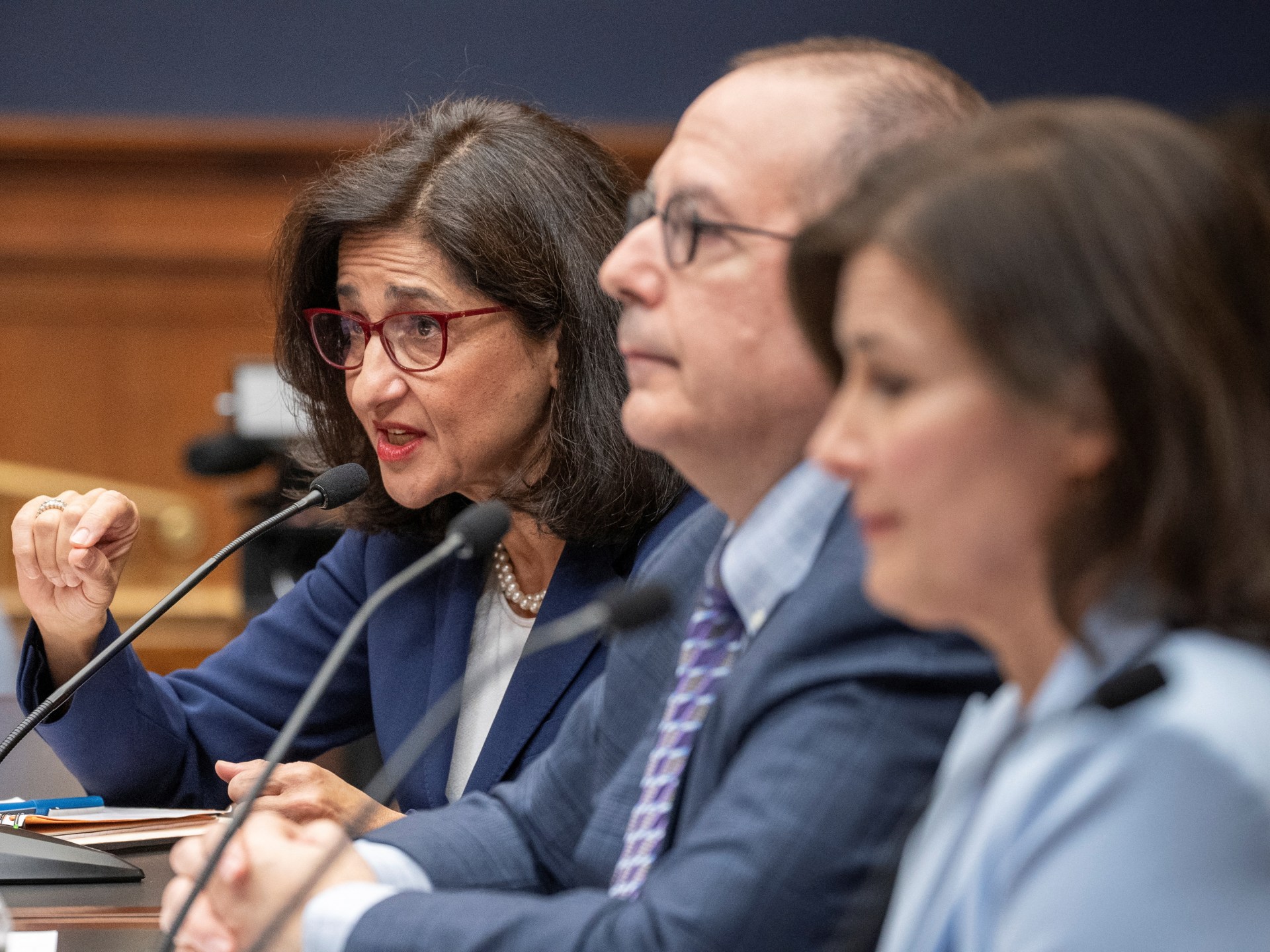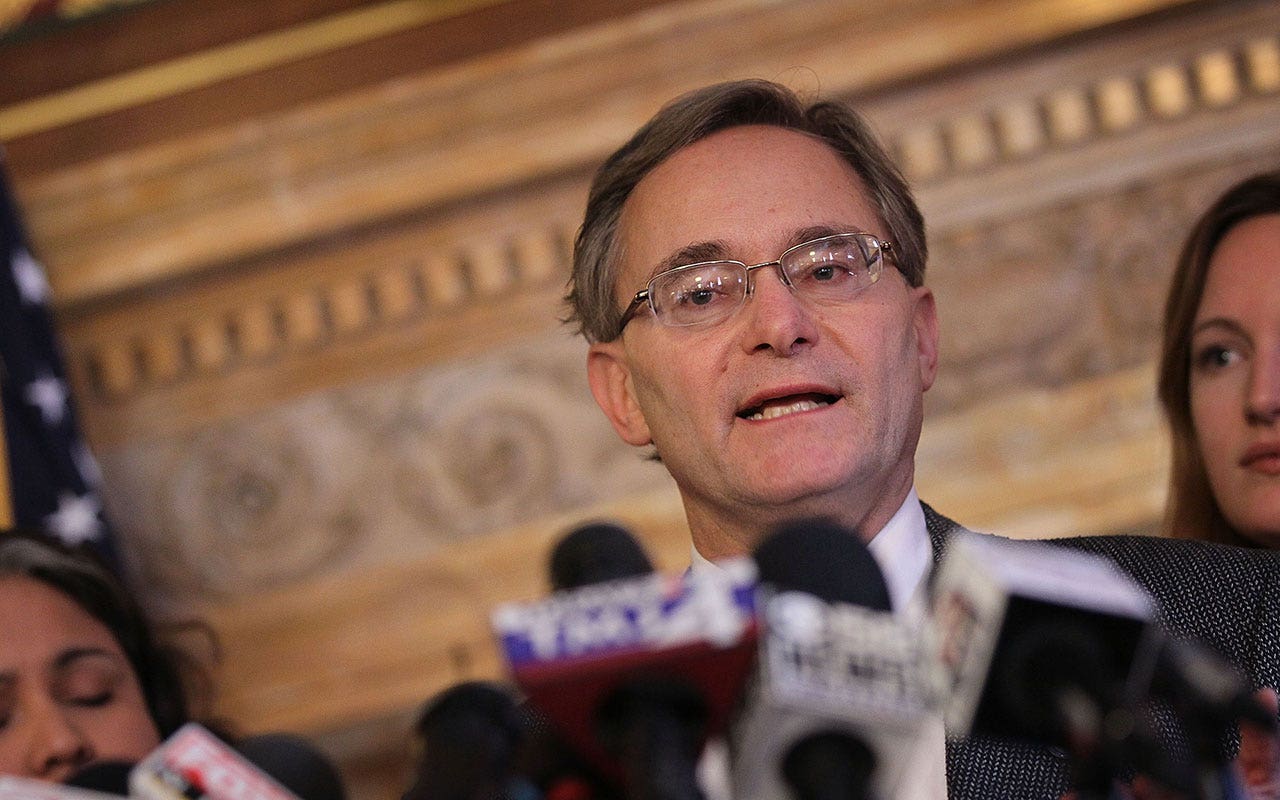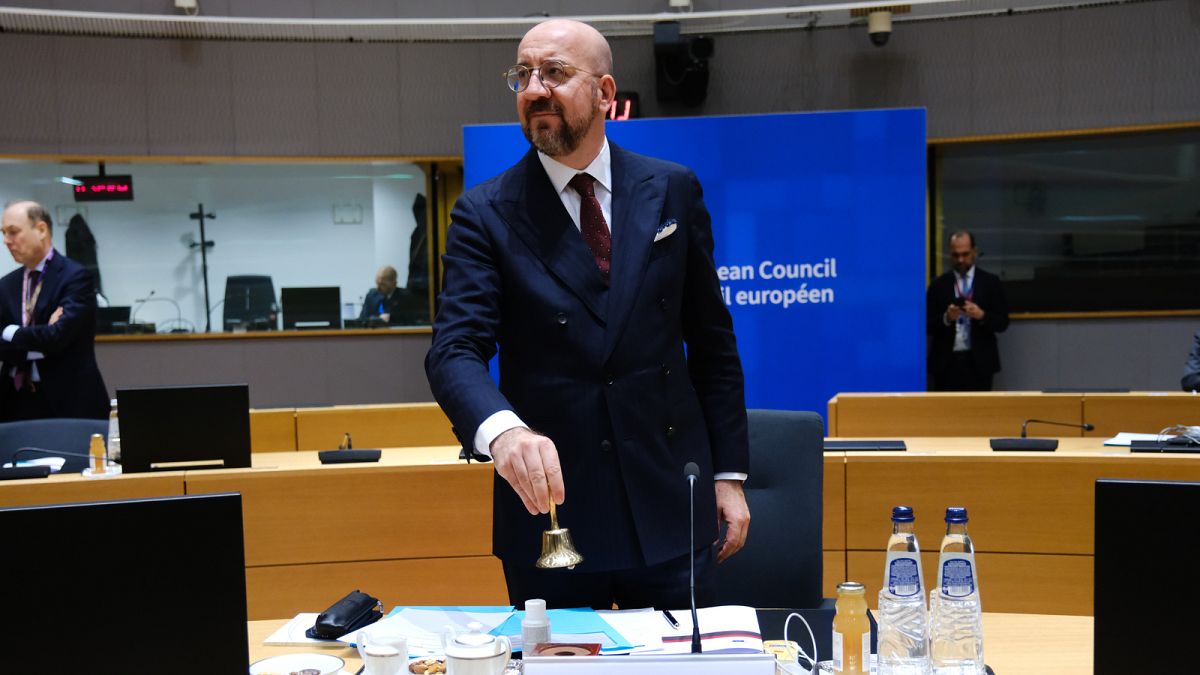Maine
Portraits of Maine women in politics displayed at the State House

AUGUSTA, Maine (WABI) – Portraits of Maine women in politics were on display at the State House Monday.
Local painter Jerri Whitman displayed her paintings of 25 women in the Hall of Flags.
The project started when she was visiting the State House and noticed the lack of female representation on the walls.
The exhibit coincides with Women’s History Month.
Women have been serving in the state house since 1922.
Whitman says Margaret Chase Smith is the only woman whose portrait hangs on the walls.
”All the men had been done just about it that were elected the first 100 years, so why not the women? These are not official portraits. These are to bring attention to why there are not more women represented on the walls is to tell a story and detail the history of our state through the women who have served” Whitman says.
The paintings are set to be exhibited at the Margaret Chase Smith library in Skowhegan from May through November
Copyright 2024 WABI. All rights reserved.

Maine
Maine 2nd Congressional District GOP candidates mix it up at state convention

The Republican candidates for the 2nd Congressional District mixed it up in Augusta Saturday as both men work to gain momentum ahead of the June 11 primary.
Rep. Mike Soboleski of Phillips and Rep. Austin Theriault of Fort Kent are competing for the right to face Democratic U.S. Rep. Jared Golden in November.
The Saturday debate — the first between the two men — kicked off the second day of the Maine Republican Party Convention, where more than 1,000 delegates and others gathered to gear up for a big political year.
And while Theriault and Soboleski largely agreed on border security and support for veterans, they offered different visions for their first action if elected to Washington.
Soboleski, a retired Marine and small businessman, said he would work with Sen. Rand Paul (R-KY) to find a way to punish Dr. Anthony Fauci, who led the country’s COVID-19 response.
“It would be to put in any kind of legislation I can to help Rand Paul bring Anthony Fauci to justice,” he said. “To hold that man accountable.”
Theriault, a former NASCAR driver, said his first act would be to “fund the completion of Trump’s border wall.”
“That’s by far the No. 1 issue if you’re talking to Republicans, Democrats or independents right now,” Theriault said.
Trump endorsed Theriault in the race and recent fundraising reports show Theriault with a large financial lead. Theriault has raised more than $1 million, while Soboleski has brought in just over $100,000, according to Federal Election Commission reports.
Soboleski worked to draw contrasts, criticizing Theriault for a vote in the Legislature to create safe injection sites for those with substance use disorder.
“I was against that, Rep. Theriault you voted in favor of those safe injection sites,” Soboleski said.
Theriault shot back: “How dare you stand on the grave of dead kids Mike.”
Theriault said he has family members who suffer from addiction and that stigmatizing their illness will not help them recover.
“As a Christian we need to reach these people and we need to bring them into recovery,” he said.
When asked if they support embattled House Speaker Mike Johnson, Theriault said he “wouldn’t comment on whether I would support him or not.”
He said he opposes the aid to Ukraine recently approved, which drew applause from the audience.
Soboleski said he doesn’t approve of Johnson and that he also opposes the foreign aid package because it provides aid to Gaza and Israel. He said he’s firmly in support of Israel.
“How many people are going to die just because we funded both sides of the fight?” he said.
The candidates emphasized different reasons they believe they can defeat Golden in November.
Theriault said he’s got the financial backing and the ground game to get the votes needed to win.
“Our campaign, I’m proud to say, has not only blew past the million-dollar threshold of money raised primarily from Maine but we’re going to continue to work hard to get people on board who are not consistently involved in the political process,” he said.
Soboleski highlighted his military experience, saying he’s ready to take on Golden, a fellow veteran.
“Sending another veteran up against a veteran, that’s what’s going to win that CD2,” Soboleski said.
Maine
Rooks: National Popular Vote Compact a highlight of disjointed Maine legislative session

When the Legislature left town last week, it did so among confusion and a bevy of bills not acted on.
The sun was up by Thursday’s 5:30 a.m. adjournment. Legislators were exhausted and many were unhappy about the way the end-of-session crunch was handled.
This outcome may have been inevitable when a late budget amendment filed by House Appropriations Chair Melanie Sachs (D-Freeport) blew up a contentious but relatively quiet struggle over election year spending.
The now-notorious amendment took back half of the highway funding garnished from the General Fund and reduced a pension exemption for state workers. It roused immediate concern from Gov. Janet Mills, who also vowed to veto a storm relief package if it contained $100 million in additional spending.
In the end, lawmakers got some of what they wanted. The storm relief, some $50 million, was amended to add $10 million for small business.
And lawmakers quietly rejected a $108 million savings account proposed by Mills and instead allocated it to additional spending. The “savings” made little sense since Mills had also proposed withdrawing the storm relief money from the existing “rainy day” fund.
Because the budget debate extended through the final day, only a handful of enacted bills “on the table” at Appropriations were funded, leaving more than 100 to die.
One pleasant surprise: a real bond package for the first time since 2019. It’s a mini-package of $65 million, with $30 million for trails, $25 million for research and development, and $10 million for community historic preservation.
The relevant bills were proposed by current and former Appropriations members, who have the perseverance to overcome long odds. The preservation bond is a tribute to retiring Rep. Sawin Millett, now 86, whose legislative service began in 1967.
Traditionally, Maine governors propose robust biennial bond packages, but Mills has not. Her predecessor, Paul LePage, blocked any bond he could, sometimes extra-legally, so one must go back to Gov. John Baldacci (2003-11) to find significant investments subject to voter approval.
A similar package today would have a current value of $400-$500 million. We could use one since even property-wealthy communities like Scarborough and Cumberland are turning down locally funded school bonds. School construction was once a shared responsibility between local districts and the state, but no more.
Perhaps the biggest disappointment was the lack of a vote on a “red flag” law that could have prevented the Lewiston massacre last Oct. 25, when 18 Mainers were senselessly murdered and another 13 maimed.
Police and Army officers are still feuding over who should have triggered the substitute “yellow flag” law offered by Mills in 2019. If, under “red flag,” family members could have petitioned a judge the shootings might not have happened.
Still, lawmakers enacted meaningful gun safety laws, including a 72-hour waiting period that could prevent many suicides. Mills was still considering those bills as of this writing.
Another notable bill moved Maine toward a public defender system for indigent criminal defendants after smaller steps were taken previously.
The Portland Sea Dogs should be able to stay put after the House reversed its opposition to the inevitable tax break all professional sports stadiums seem to demand.
The House also switched its stance so a sand dune created by human intervention won’t block construction of a wind turbine port on Sears Island – a project still facing many obstacles before construction can begin.
A typical “short session” – four months rather than six – rarely produces any signature changes in state law.
Even columnists have their favorites, though.
One measure I’ve long advocated, as readers may have noticed, is the National Popular Vote Compact that became law on the seventh try.
First introduced by former House Speaker John Martin in 2007 – joined by two other speakers, Libby Mitchell and Hannah Pingree – it passed by a one-vote margin in the House.
It will have no effect on the 2024 presidential election, since Michigan is the only other state still seriously considering it. If Michigan adds 15 electoral votes to Maine’s four, plus 10 provided by Minnesota last year, there will be 224 of the 270 needed to effectively choose a president by popular vote.
If that day comes, it will mark a sea change. No more swing states deciding elections; each vote will count exactly the same.
Perhaps after more than two centuries of allowing states to substitute for the voters, Americans could actually elect their president directly. Now that would be revolutionary.
Douglas Rooks has been a Maine editor, columnist and reporter since 1984. He is the author of four books, most recently a biography of U.S. Chief Justice Melville Fuller, and welcomes comment at drooks@tds.net
Maine
Maine governor signs off on new gun laws, mental health supports in wake of Lewiston shootings

Democratic Gov. Janet Mills on Friday signed into law a suite of gun safety legislation approved by lawmakers after the deadliest mass shooting in state history, expanding background checks for private sales of weapons, bolstering the state’s “yellow flag” law, criminalizing the transfer of guns to prohibited people and expanding mental health crisis care.
The governor told lawmakers during her State of the State address that doing nothing was not an option after an Army reservist with an assault rifle killed 18 people and injured 13 others in Lewiston on Oct. 25.
GOVERNOR KILLS MAINE PROPOSAL TO END ‘THREE STRIKES’ LAW FOR PETTY THEFT
The bills drew opposition from Republicans who accused Democrats, who control both legislative chambers, of using the tragedy to advance proposals, some of which had been previously defeated. Mills said Friday the proposals would improve public safety while respecting the state’s long traditions of gun ownership and outdoor heritage.
“This law represents important, meaningful progress, without trampling on anybody’s rights, and it will better protect public safety by implementing reasonable reforms and by significantly expanding mental health resources,” Mills said.
Gov. Janet Mills attends an event, March 11, 2022, in Augusta, Maine. Mills on Friday, April 26, 2024, signed off on a suite of gun safety legislation approved by lawmakers after the deadliest mass shooting in state history, expanding background checks for private sales of weapons, bolstering the state’s “yellow flag” law, criminalizing the transfer of guns to prohibited people and expanding mental health crisis care. (AP Photo/Robert F. Bukaty)
The new law signed by the governor doesn’t require universal background checks but it does require background checks for people who advertise a gun for sale on Craigslist, Facebook Marketplace or elsewhere. Sellers would be required to conduct a background check utilizing commercially licensed businesses like L.L. Bean or Cabela’s.
The legislation includes changes to the state’s yellow flag law that allows police to assess an individual, take the person into protective custody for a mental health evaluation and hold a hearing before a judge to remove guns from someone in a psychiatric crisis.
The new law allows police to go directly to a judge for a warrant, streamlining the process. It eliminates a hurdle when a deputy was stymied by the Lewiston gunman’s refusal to answer the door for a required face-to-face meeting that’s necessary under current law. Law enforcement members have said in testimony about the shootings that the state’s existing yellow flag law was cumbersome and hard to apply.
Republicans in the state remain opposed to the bill, specifically because of the expanded background check proposal, said the Maine House of Representatives Republican leader, Rep. Billy Bob Faulkingham, on Friday.
“House Republicans have voiced ongoing support for strengthening Maine’s so-called yellow flag law and mental health services, but oppose the governor’s bill,” Faulkingham said. “The unenforceable background check provision will only create confusion among law-abiding Mainers.”
Supporters of expanded gun control laws, who have advocated for the passage of the new standards for months, described the approval of the rules as a victory. Twenty-two states now have a background check law, said John Feinblatt, president of Everytown for Gun Safety.
Advocates also said they’re hopeful other new gun measures approved by lawmakers in Maine will soon become law.
“Today is a victory for the gun violence prevention movement and a demonstration of what Mainers can accomplish to keep our communities safe when we work together,” said Vicki Farsaci, a volunteer with the Maine chapter of Moms Demand Action.
The bill signed by the governor also strengthens legal standards for prosecution and penalties to deter other people from selling weapons to prohibited buyers, making it a felony crime. The governor’s office said in a statement that the new approach “will mean that transfers of firearms to family members or trusted friends, as is common in Maine, will remain unchanged, but it will incentivize checks against the (National Instant Criminal Background Check System) for private, unadvertised sales to unknown individuals through the threat of increased risk of prosecution and prison time.”
Mills’ approvals of the gun proposals came a day after a special commission she convened interviewed fellow reservists of Card who raised warnings about Card’s increasingly erratic behavior. Card was found dead of a self-inflicted gunshot wound in the aftermath of the mass shooting after an extensive search.
One of the fellow reservists interviewed on Thursday, Sean Hodgson, told superiors in September: “I believe he’s going to snap and do a mass shooting.”
CLICK HERE TO GET THE FOX NEWS APP
Mills also proposed the creation of a new violence and injury prevention program requiring the Maine Center for Disease Control and Prevention to serve as a clearinghouse for data from law enforcement, hospitals, schools and other sources to inform public policy decisions.
Her proposal for a network of crisis centers, meanwhile, would build upon the first such facility already in operation in Portland and a second one that’s being created in central Maine.
-

 Movie Reviews1 week ago
Movie Reviews1 week agoMovie Review: The American Society of Magical Negroes
-

 World1 week ago
World1 week agoIf not Ursula, then who? Seven in the wings for Commission top job
-

 Kentucky1 week ago
Kentucky1 week agoKentucky first lady visits Fort Knox schools in honor of Month of the Military Child
-

 World1 week ago
World1 week agoColumbia University leaders face scrutiny over anti-Semitism on campus
-

 News1 week ago
News1 week agoHouse passes bill requiring warrant to purchase data from third parties
-

 Politics1 week ago
Politics1 week agoTrump trial: Jury selection to resume in New York City for 3rd day in former president's trial
-

 Politics1 week ago
Politics1 week agoFormer Wisconsin Democratic Rep. Peter Barca launches congressional comeback bid
-

 World1 week ago
World1 week agoEU leaders weigh Lebanon partnership in response to Middle East crisis







/cdn.vox-cdn.com/uploads/chorus_asset/file/25255185/246965_vision_pro_VPavic_0001.jpg)











